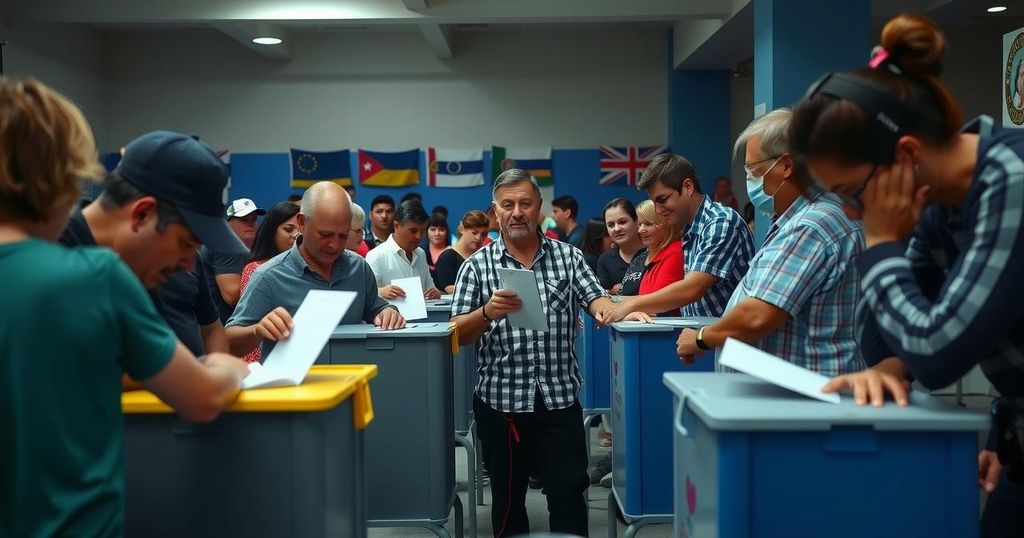Uruguay’s Presidential Run-Off: A Choice Between Left and Right

In Uruguay’s presidential run-off, voters choose between the leftist Frente Amplio’s Yamandu Orsi and right-wing Alvaro Delgado of the National Party. The election, characterized by tight polling, follows five years of conservative governance. Both candidates seek to attract undecided voters amid economic challenges. Initial results are expected soon after voting concludes.
Voting commenced in Uruguay’s presidential run-off election, where citizens are tasked with selecting between the left-wing candidate, Yamandu Orsi of the Frente Amplio (Broad Front), and the right-wing Alvaro Delgado of the National Party. Previously led by the popular former President Jose Mujica, the leftist coalition hopes to reclaim power after a five-year term of conservative governance under President Luis Lacalle Pou. Ballot stations opened at 8:00 AM local time and will remain open until 7:30 PM, with preliminary results anticipated shortly thereafter.
In an electorate of approximately 3.4 million, the latest opinion polls indicate a remarkably close contest, with predictions suggesting fewer than 25,000 votes could separate the leading candidates. Unlike the intensely polarized political climates observed in other South American nations, Uruguay’s political landscape exhibits a degree of stability, with many voters feeling a sense of comfort in the moderate approaches of both the left and right coalitions.
Alvaro Delgado, who has garnered support from various conservative factions, including the Colorado Party, seeks to justify a continuation of the current government’s policies, which enjoy a respectable approval rating of 50%. Conversely, Yamandu Orsi, who previously received 43.9% in the October elections, has pledged to adopt a “modern left” policy strategy without making drastic shifts to the established norms. As both candidates aim to unify voters from smaller parties and engage those who participated less in the initial round of elections, there remains a palpable sense of uncertainty regarding their engagement strategies, especially following an inconclusive debate that did not sway public opinion as expected.
As voters confront economic pressures such as inflation and rising living costs that have unsettled many incumbents globally, focus now turns to whether Uruguay will mirror these national trends or maintain its more stable political trajectory. As the nation casts its final votes, the outcome of this election may hold significant implications for its future direction, particularly as it reflects broader socio-economic dynamics within the region.
The run-off election in Uruguay serves as a pivotal moment for its political landscape. Following a tenure characterized by right-wing governance, the leftist coalition, represented by Yamandu Orsi of the Broad Front, is endeavoring to regain power under the celebrated former President Jose Mujica’s legacy. The election occurs against the backdrop of regional electoral trends, where many incumbents face opposition due to public dissatisfaction with economic conditions. Uruguay’s relatively moderate political environment distinguishes it from its neighbors, influencing voter behavior and party dynamics significantly.
In conclusion, as Uruguayans approach a decisive run-off election, the tension between the leftist and right-wing blocs is palpable. Despite the solid support for Yamandu Orsi’s Broad Front, the ruling conservative coalition, under Alvaro Delgado’s candidacy, aims to leverage its achievements during its governance term. The outcome will determine whether Uruguay continues with its conservative policies or shifts back to a left-oriented government, amidst a global trend of voters expressing dissatisfaction with incumbent leadership due to rising economic challenges.
Original Source: www.aljazeera.com






